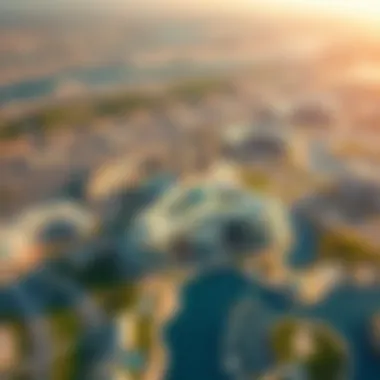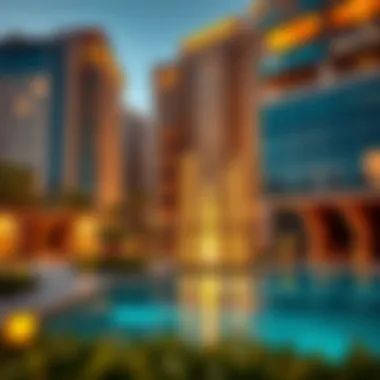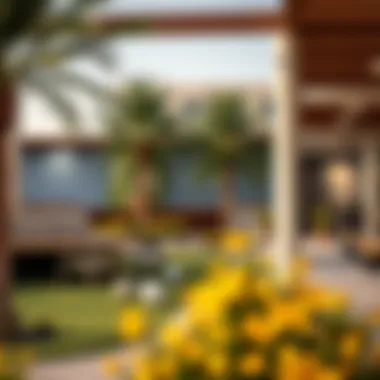Exploring Golden Finger International City in Dubai


Intro
Overview of the Development
Residential options range from cozy apartments to lavish villas, accommodating diverse preferences and budgets. Commercial spaces feature state-of-the-art offices and retail outlets, positioned to attract both local and international businesses. Such a mixed-use environment not only enhances the vibrancy of the area but also provides convenience for residents.
In addition, the use of sustainable practices in construction is noteworthy. Developers have focused on environmental stewardship, integrating green spaces and energy-efficient technologies throughout the project. This commitment to sustainability aligns with global goals to reduce carbon footprints and promote healthier lifestyles.
Location and Accessibility
The accessibility aspect is further enhanced by the proximity to Dubai International Airport and the Expo 2020 site, cementing its appeal for both residents and businesses. As developers often say, accessibility can greatly dictate property value. Prospective buyers and investors should note that with increasing demand for real estate in accessible areas, this location is likely to see a rise in value over the coming years.
"Accessibility and location are more than just headers on a brochure; they are the golden key to real estate success."
Historical Context
Inception and Development
Developers were spurred on by burgeoning demand for high-end living spaces, leading to significant investments in infrastructure and amenities. The project's blueprint reflects a blend of modern architectural styles, harmonizing with surrounding landscapes while incorporating sustainable practices throughout its phases of construction. The early stages focused on establishing a holistic community, promoting not just physical infrastructure but also striving for social connectivity among residents.
Evolution of the Area
Emergence of nearby business parks and educational institutions has enriched the locale, drawing both corporations and families looking for growth and stability. This continuous evolution positions Golden Finger not just as a residential choice but as an integral part of a larger economic ecosystem.
For more insights into the development patterns and economic influences in Dubai, you can visit Wikipedia or refer to sources like Britannica for historical context.
Architectural Design
Key highlights of the architectural design include:
- Innovative Layouts: The city is designed with mixed-used spaces, fostering both residential and commercial interactions, encouraging a vibrant community atmosphere.
- Green Roofs and Open Spaces: Many buildings incorporate green roofs, which not only contribute to the city's aesthetic appeal but also help in cooling and reducing the urban heat effect.
- Cultural Landmarks: The incorporation of cultural landmarks, such as art installations and plazas, gives the area a distinct character, promoting local artists and traditions.


This blend of design elements is integral not just for aesthetic purposes but also for functionality, enhancing both liveability and investment appeal.
Amenities and Facilities
Some of the remarkable amenities include:
- Shopping and Entertainment Venues: An assortment of retail outlets ranging from high-end brands to local boutiques, alongside cinemas and entertainment complexes that cater to families and young professionals alike.
- Healthcare Facilities: Proximity to top-notch hospitals and clinics ensures peace of mind for residents, providing essential healthcare services within a convenient distance.
- Educational Institutions: Quality educational establishments, from nurseries to higher education, are coupled with sporting facilities, promoting a well-rounded lifestyle for families.
- Recreational Areas: Parks, fitness centers, and community halls enhance social interaction and promote a healthy, active lifestyle.
These features collectively create an environment where residents enjoy a high quality of life, ensuring that the city is not just a place to live but a community to thrive in.
Environmental Considerations
Important environmental initiatives include:
- Sustainable Water Management: Implementing advanced water conservation and recycling techniques to manage the scarce water resources efficiently.
- Eco-Friendly Infrastructure: Usage of materials that minimize environmental impact and energy-efficient systems that support the aim for net-zero emissions in the long term.
- Biodiversity Preservation: Initiatives to protect and enhance local flora and fauna, ensuring a balanced ecosystem within urban settings.
Such practices reinforce the development’s commitment to not only provide housing but also protect its natural surroundings, ensuring the residents can enjoy a sustainable and eco-conscious lifestyle.
Investment Opportunities
Market Trends
- Rising Demand: The population growth in Dubai is a driving force for real estate demand, with an increasing number of expatriates choosing to settle in urban hotspots.
- Luxury Appeal: The market is trending toward luxury developments, which cater to high-net-worth individuals looking for premium living spaces.
Projected ROI
According to recent analyses, properties in this development are expected to yield returns ranging from 7% to 10% annually, which is quite competitive when matched against global standards. Several influences factor into this projection:
- Quality of Construction: With state-of-the-art design and solid infrastructure, the quality of the investment is inherently higher, thereby enhancing resale potential.
- Influence of Nearby Developments: Proximity to major transportation networks, commercial centers, and lifestyle amenities further boosts property values.
- Market Stability: Unlike some fluctuating markets, Dubai has proved resilient, with demand that often outpaces supply, leading to stable returns.
Comparative Analysis with Other Developments


Several factors make this development a more attractive option, including:
- Growth Potential: Given its newer status, this city has more room for growth, with opportunities for development expanding in tandem with the area's increasing popularity.
Community and Lifestyle
Demographics of Residents
- Age Distribution: Many young professionals and families are drawn to the area, reflecting its vitality and appeal.
- Nationalities: There’s a significant presence of expatriates alongside native populations, which creates a dynamic community atmosphere.
- Education Levels: The area sees a high level of education among its residents, fostering a more informed community ready to engage in various socioeconomic activities.
Such demographics not only enrich the social landscape but also enhance the marketability of housing options. Properties in neighborhoods with diverse populations tend to be more desirable as they often cater to a wide array of needs and preferences.
Cultural Influences
- Culinary Diversity: With numerous international restaurants, residents can indulge in a variety of cuisines, making dining a cultural exploration.
- Community Events: Regular events infused with art, music, and tradition help bridge cultural gaps, promoting unity and understanding.
- Religious and Cultural Facilities: Places of worship and cultural centers serve diverse faiths and backgrounds, catering to the spiritual needs of residents.
Such influences contribute significantly to the identity of the development, making it a beacon for those interested in multicultural integration. Potential investors should note that an area rich in culture can enhance the intrinsic value of properties over time.
Social Infrastructure
- Educational Institutions: Top-tier schools and colleges cater to the educational needs of families, drawing in inhabitants eager for quality learning environments.
- Healthcare: Access to modern healthcare facilities ensures residents receive quality medical care, thus, reassuring families about their health and well-being.
- Recreational Areas: Parks, sports complexes, and community centers provide essential spaces for leisure and social activities, fostering a sense of belonging among residents.
Regulatory Framework
Property Ownership Laws
To delve deeper into property ownership laws, it’s imperative to note the following:
- Freehold Ownership: Foreign investors can own properties outright in designated freehold areas. This means full control over the property, which is highly attractive for long-term investment.
- Leasehold Ownership: In areas categorized as leasehold, foreign investors may lease property for a set term, usually up to 99 years. This can be a flexible option for those interested in short- to medium-term investments.
- Titles and Deeds: Investors must ensure their titles and deeds are properly registered with the Dubai Land Department. A failure to do so can lead to disputes in property ownership.
- Sub-Leasing Rights: Leaseholders may have the ability to sub-lease their properties, broadening the potential for revenue generation.
Investment Regulations


Here’s a breakdown of relevant investment regulations that every stakeholder should be aware of:
- Minimum Investment Threshold: In some instances, there are minimum investment amounts required to qualify for ownership. This is particularly important for foreign investors who are often drawn to Dubai due to its lucrative returns.
- Licensing Requirements: All property developments must have the right licenses issued by Emirati authorities. Engaging in transactions without proper licenses can lead to severe penalties.
- Tax Incentives: The absence of property taxes and the attraction of other financial incentives make Dubai a prime location for investment. However, it's important to stay updated on any changes to this landscape.
- Restriction on Financing: Some regulations put limits on how much of the property can be financed through a mortgage, which can impact overall investment strategy. Investors need to thoroughly assess financing options to ensure compliance.
Challenges and Risks
Market Volatility
Consider the financial downturns of previous years; property prices dipped significantly during those periods. Investors need to keep an eye on key indicators. Key things to watch include:
- Economic Growth: The health of Dubai's economy plays a major role. Look at GDP growth rates and trends in tourism.
- Demand and Supply: The balance of available properties against buyer interest often dictates prices.
- Global Events: Occasional shake-ups like geopolitical tensions can ripple through the market.
When contemplating the market, it’s wise to prepare budgets that can withstand shifts. Investors might also think about keeping properties longer, as real estate often rebounds over time.
"Real estate is not just about buying bricks and mortar; it's about understanding what influences these bricks over time."
Regulatory Changes
A few considerations around regulatory changes include:
- Government Policies: Keep an eye on new policies that can impact market access, taxes, or investment incentives.
- Ownership Laws: Changes in ownership structures can alter who can invest, making it crucial to stay updated on regulations.
- Building Codes: Stricter codes can increase development costs or timelines, affecting return on investment.
Staying informed can mitigate risks. Engaging with local legal experts can aid in understanding the shifting sands of regulations. Whether you are an investor or a developer, maintaining a proactive stance towards these challenges can lead to better decision-making and ultimately, profitability.
Future Prospects
Upcoming Developments
- Residential Expansion: New high-rise towers and themed apartment complexes are set to redefine living standards. They highlight contemporary design while promoting sustainable living. For instance, developments that offer smart home technology and eco-friendly materials are not just buzzwords but actionable plans in the making.
- Transportation Enhancements: Infrastructure improvements, particularly in transportation, will make the area more accessible. Plans include the extension of metro lines and the introduction of smarter traffic management systems. This will ease commutes and foster connectivity with other key city areas.
Strategic Growth Plans
- Community Development Initiatives: Engaging the existing and future residents in community-building activities will not only enhance social ties but also enrich the cultural landscape. Workshops, local markets, and community events can foster an ongoing sense of belonging, leading to an enriched lifestyle for all.
- Enhanced Infrastructure Investments: Infrastructure is a backbone of any thriving city. Investments are planned in utility systems and public spaces, creating an efficient and user-friendly environment. This includes parks, recreational facilities, and communal gardens that promote a sense of well-being and connectivity among residents.















